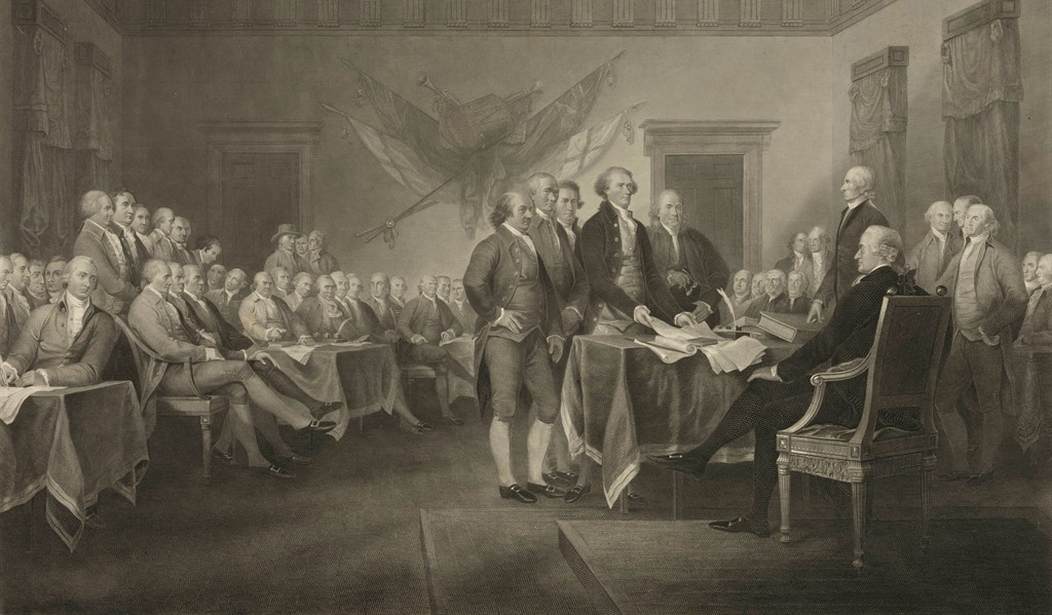On June 28, 1776, a procession of British Warships and troop transports, under the command of Admiral Richard Howe, began arriving in New York harbor. Day after day thereafter, more and more ships arrived accumulating into the largest naval force the British Empire ever assembled: 500 ships carried 32,000 troops dedicated to destroying a rebellion in the American colonies. Admiral Howe, his forces so overwhelming to the eye, was confident of a rebel surrender, when he sent a last petition to the American commander: that if the rebels laid down their arms, they would be granted the King’s pardon. General Washington sent a message back: “Those who have committed no fault, want no pardon.”
The Second Continental Congress had assembled some months before in Philadelphia, and the colonials determined on naming a military commander of a Continental Army; on the colonies developing their own distinct constitutions; and on writing an official document separating the colonies from English rule. The military commander was George Washington, and the document became The Declaration of Independence.
A committee comprised of Benjamin Franklin, John Adams, Robert Livingston, Roger Sherman and Thomas Jefferson were charged with composing the document. Jefferson did the majority of the writing, taking 17 days to execute the task, with the fullest knowledge of its historical importance.
The Declaration begins: “When in the Course of human events, it becomes necessary for one people to dissolve the political bands which have connected them with another, and to assume among the powers of the earth, the separate and equal station to which the Laws of Nature and of Nature's God entitle them, a decent respect to the opinions of mankind requires that they should declare the causes which impel them to the separation.”
“We hold these truths to be self-evident, that all men are created equal, that they are endowed by their Creator with certain unalienable Rights, that among these are Life, Liberty and the pursuit of Happiness.--That to secure these rights, Governments are instituted among Men, deriving their just powers from the consent of the governed, --That whenever any Form of Government becomes destructive of these ends, it is the Right of the People to alter or to abolish it, and to institute new Government, laying its foundation on such principles and organizing its powers in such form, as to them shall seem most likely to effect their Safety and Happiness.”
Recommended
Among the causes for the separation are listed:
“He (the present King) has refused his Assent to Laws, the most wholesome and necessary for the public good.”
“He has forbidden his Governors to pass Laws of immediate and pressing importance.”
“He has erected a multitude of New Offices and sent hither swarms of Officers to harrass our people and eat out their substance.”
“He has combined with others to subject us to a jurisdiction foreign to our constitution, and unacknowledged by our laws; giving his Assent to their Acts of pretended Legislation…”
“For taking away our Charters, abolishing our most valuable Laws, and altering fundamentally the Forms of our Governments.”
The Declaration ends: “for the support of this Declaration, with a firm reliance on the protection of divine Providence, we mutually pledge to each other our Lives, our Fortunes and our sacred Honor.”
The Declaration was adopted on July 4th and the United States was born.
On July 19th, General Washington had the Declaration read to the entire Continental Army, then surrounded by the preeminent Army and Navy of the world, while attempting to defend a harbor, without a navy. Washington wanted his men to know they were fighting on the front lines of the eternal war for the natural, inalienable rights of humanity.
The battle that ensued was a route of the American forces, which were enveloped on the Guwanus Heights of Long Island. When his left flank broke, American General William Stirling ordered every regiment of his command to retreat, except for one: Mordecai Gist’s 1st Maryland, which Gist had recruited, trained and equipped – the 1st was ordered to charge!
With words of the Declaration still echoing in their ears, among cannon and musket blasts, Gist’s 1st Maryland, 270 strong, charged 2,000 of the best trained, entrenched Scot’s Highlanders in the British Army – and drove them back. Gist recovered his men and attacked again, to cover the Continental Army’s retreat. After the charges, Mordecai and eight of his men remained alive, having helped the Continental Army survive. In the end, 9,000 members of Washington’s army survived one of the worst military disasters of the new nation, more importantly, the Declaration survived…
The Declaration was read throughout the states of a new nation, it accompanied the soldiers in their victory in Saratoga, and in their defeat, when the capital city of Philadelphia was taken by the General William Howe, and the new Congress itself was sent into exile…When Benjamin Franklin heard the news in Paris, he leapt for joy and yelled: “Howe has not taken Philadelphia, Philadelphia has taken Howe!”
Franklin understood the revolution wasn’t in the capital, it was in the words of the Declaration of Independence.
The Declaration was read through the winter at Valley Forge, and ultimately at the revolutionary victory of Yorktown. And like the soldiers and new citizens of that war, we should hold the Declaration of Independence as a work of glory forth for the common rights, the common laws and the common freedoms of these United States.
Richard C. Lyons, author of The DNA of Democracy: Volume I and Shadows of the Acropolis: Volume II is a third-generation printer, whose early career centered on religious and special education publishing. Lyons has since engaged in literary pursuits as a poet, essayist, screenwriter, and indie publisher

























Join the conversation as a VIP Member